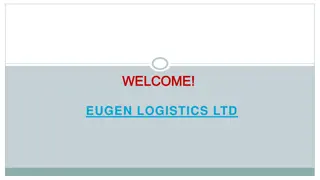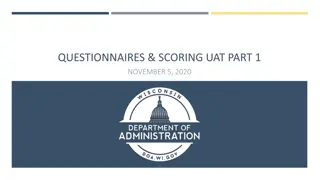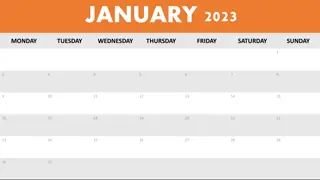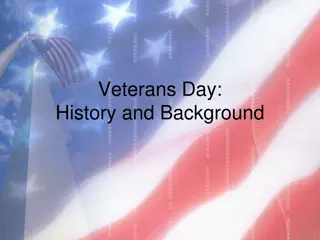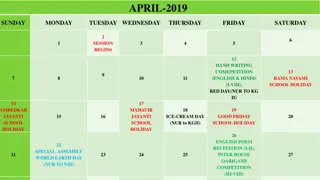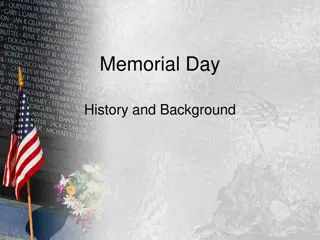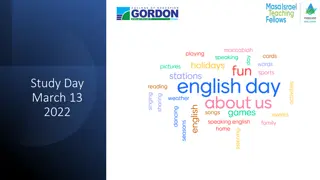
Financial Management Tips for Independent Living Centers
Explore financial management insights for independent living centers, including budget comparisons, accounts receivable aging, annual filings, penalties, and more. Discover valuable information on handling financial reports and important filings to ensure compliance and financial stability.
Download Presentation

Please find below an Image/Link to download the presentation.
The content on the website is provided AS IS for your information and personal use only. It may not be sold, licensed, or shared on other websites without obtaining consent from the author. If you encounter any issues during the download, it is possible that the publisher has removed the file from their server.
You are allowed to download the files provided on this website for personal or commercial use, subject to the condition that they are used lawfully. All files are the property of their respective owners.
The content on the website is provided AS IS for your information and personal use only. It may not be sold, licensed, or shared on other websites without obtaining consent from the author.
E N D
Presentation Transcript
>>Slide 1 ILRU s IL-NET National Training and Technical Assistance Center for Independent Living 1 ILRU s IL-NET National Training and Technical Assistance Center for Independent Living
>> Slide >> Slide 2 2 Financial Management for Financial Management for Centers for Independent Living Centers for Independent Living Presenters: Presenters: John Heveron John Heveron Paula McElwee Paula McElwee 2 ILRU s IL-NET National Training and Technical Assistance Center for Independent Living
>> Slide >> Slide 3 3 Other Financial Reports Other Financial Reports Some organizations include other financial reports in their interim internal financial statements. Budget comparisons are common. How many organizations use these? Do you find them useful? Accounts Receivable aging. Accounts Payable aging. Does anyone use a dashboard report? What things do you track on that report? The latest version of QuickBooks can generate dashboard reports. Dashboards can be desirable for communicating your financial statements to your board and other stakeholders. 3 ILRU s IL-NET National Training and Technical Assistance Center for Independent Living Independent Living ILRU s IL-NET National Training and Technical Assistance Center for
>> Slide >> Slide 4 4 Annual Filings Annual Filings Your organization is generally responsible to file form 990 or form 990 EZ. These are due 4 months after your year-end and there are significant penalties for late filing. Extensions are possible. You may also have a filing with your Charities Bureau. Do you solicit funds in other states? Are you sure? 4 ILRU s IL-NET National Training and Technical Assistance Center for Independent Living Independent Living ILRU s IL-NET National Training and Technical Assistance Center for
>> Slide >> Slide 5 5 Penalties Penalties Pop quiz what do you do if you receive a penalty notice? Pay it? Protest it? How do you think IRS selects nonprofits to audit? Would you like to know exactly what they are going to ask if you are selected? 5 ILRU s IL-NET National Training and Technical Assistance Center for Independent Living Independent Living ILRU s IL-NET National Training and Technical Assistance Center for
>> Slide >> Slide 6 6 Other Filings Other Filings Payroll tax filings and payments. How many use outside service bureaus? How many prepare payroll in-house? There are significant penalties for late deposit of payroll taxes and certain individuals can be held responsible for unpaid taxes and related penalties. Withholding rules and the withholding authorization was updated recently. https://www.irs.gov/forms-pubs/about- form-w-4. The new form is more complex and requires employees to do more calculations. See the FAQs at the link above. Is your personnel policy up-to-date with all requirements including federal and state mandated notifications? 6 ILRU s IL-NET National Training and Technical Assistance Center for Independent Living Independent Living ILRU s IL-NET National Training and Technical Assistance Center for
>> Slide >> Slide 7 7 Other Filings Other Filings,cont d. What about state sales tax? Generally if you have registered for tax exemption, you are exempt from sales tax on purchases for use by your Organization. Some states do charge sales tax to non-profits, however, so check your state s requirements for exemptions on your purchases. This isn t necessarily exemption for your employees, your clients or your donors. Sales tax exemption doesn t necessarily extend to your sales. If you are selling products you may need to register, collect, and remit sales tax. 7 ILRU s IL-NET National Training and Technical Assistance Center for Independent Living Independent Living ILRU s IL-NET National Training and Technical Assistance Center for
>> Slide >> Slide 8 8 Employees, v. Subcontractors, v. Volunteers Employees, v. Subcontractors, v. Volunteers IRS and many state tax departments are deeply concerned about improper classification of employees because they lose revenue and resources for coverage in the case of unemployment or injury. IRS provides guidelines for distinguishing employees from subcontractors. They even provide a form to request guidance for classification. Google form SS-8 Volunteers are a different matter. A true volunteer isn t being paid. They don t get perks, gifts, or token payroll payments. Based on your states rules they may not be able to perform tasks normally performed by paid employees. 8 ILRU s IL-NET National Training and Technical Assistance Center for Independent Living Independent Living ILRU s IL-NET National Training and Technical Assistance Center for
>> Slide >> Slide 9 9 Distinguishing Employees From Subcontractors Distinguishing Employees From Subcontractors What you call the worker or the payments to them doesn t carry much weight. What is important is whether they actually operate independently. Independent contractors usually work for a number of employers at the same time and make their services available to the general public. 9 ILRU s IL-NET National Training and Technical Assistance Center for Independent Living Independent Living ILRU s IL-NET National Training and Technical Assistance Center for
>> Slide >> Slide 10 Distinguishing Employees From Subcontractors Distinguishing Employees From Subcontractors, cont d. 10 Characteristics of subcontractors include: The ability to make a profit (or incur a loss). The ability to have someone else assist or perform services. The need to obtain their own training. The need to provide their own tools or equipment. Payment is typically by the job rather than hourly, or weekly. 10 ILRU s IL-NET National Training and Technical Assistance Center for Independent Living Independent Living ILRU s IL-NET National Training and Technical Assistance Center for
>> Slide >> Slide 11 Subrecipients and Contractors Subrecipients and Contractors 11 Responsibilities with subrecipients and contractors are very different. Agencies must follow their procurement policies when dealing with contractors. Agencies have monitoring responsibilities when dealing with subrecipients. 11 ILRU s IL-NET National Training and Technical Assistance Center for Independent Living Independent Living ILRU s IL-NET National Training and Technical Assistance Center for
>> Slide >> Slide 12 Distinguishing Subrecipients From Contractors Distinguishing Subrecipients From Contractors 12 Subrecipients Contractors Determine who will receive federal assistance Are responsible for programmatic decision- making Are responsible for federal program objectives Must adhere to federal award requirements Carry out the program Provide goods and/or services based on a procurement relationship Normally provide similar goods or services to other purchasers Operate in a competitive environment Are not subject to compliance requirements of the federal award 12 ILRU s IL-NET National Training and Technical Assistance Center for Independent Living Independent Living ILRU s IL-NET National Training and Technical Assistance Center for
>> Slide >> Slide 13 Subrecipient Monitoring Subrecipient Monitoring 13 Pass-through agency must, provide the subrecipient with: the federal award, name, and CFDA number the federal awarding agency the current federal award amount being passed through the cumulative federal award amounts being passed through the date of the award the timeframe for performing services your agency s contact person your ID number the indirect cost rate (their rate if they have an approved indirect cost rate or use the de minimis 10% rate). 13 ILRU s IL-NET National Training and Technical Assistance Center for Independent Living Independent Living ILRU s IL-NET National Training and Technical Assistance Center for
>> Slide >> Slide 14 Subrecipient Risk Assessment Subrecipient Risk Assessment 14 Consider withholding funds, if there are issues, until evidence of acceptable performance is received. Consider additional monitoring and more detailed reporting. If issues are identified, consider training, consider on-site reviews or agreed-upon procedures audits of aspects of their program. If you receive Part B funds, you are a subrecipient of the Designated State Entity (DSE) and they may consider on- site reviews or other audits of your organization. 14 ILRU s IL-NET National Training and Technical Assistance Center for Independent Living Independent Living ILRU s IL-NET National Training and Technical Assistance Center for
>> Slide >> Slide 15 Subrecipient Risk Assessment Subrecipient Risk Assessment, cont d. 15 Assess the risk of the subrecipient not complying with all requirements (based on our prior experience with the subrecipient, or on the results of previous audits, or the results of federal monitoring that we are aware of). Monitor subrecipients for performance and compliance (review reports of services they have provided, review audit reports, compare actual accomplishment to objectives). Monitoring could include things such as calculation of whether per unit costs are as expected, obtaining information about cost overruns, failure to meet goals, delays and the like. 15 ILRU s IL-NET National Training and Technical Assistance Center for Independent Living Independent Living ILRU s IL-NET National Training and Technical Assistance Center for
>> Slide >> Slide 16 Information Needed from the Subrecipient Information Needed from the Subrecipient 16 The subrecipient entity must provide: Confirmation of their indirect cost rate if they have one, or their election of the 10% de minimis rate. Access to records and financial statements. The extent of procedures performed will depend on the subrecipient. If they have a federal compliance audit, request and review that to reduce other monitoring. If they are a smaller organization with limited federal funding experience, monitoring, and up front training should be much more thorough. 16 ILRU s IL-NET National Training and Technical Assistance Center for Independent Living Independent Living ILRU s IL-NET National Training and Technical Assistance Center for
>>Slide 150 >>Slide 150 Q & A and End of Day 3 Q & A and End of Day 3 17 ILRU s IL-NET National Training and Technical Assistance Center for Independent Living Independent Living ILRU s IL-NET National Training and Technical Assistance Center for
>Slide >Slide 176 For More Information For More Information 176 Contact: John Heveron, Jr. john@heveroncpa.com Paula McElwee paulamcelwee-ILRU@yahoo.com 18 ILRU s IL-NET National Training and Technical Assistance Center for Independent Living Independent Living ILRU s IL-NET National Training and Technical Assistance Center for
>> Slide >> Slide 19 IL IL- -NET NET Attribution Attribution 19 The IL-NET is supported by grant numbers 90ILTA0001 and 90ISTA0001 from the U.S. Administration for Community Living, Department of Health and Human Services, Washington, D.C. 20201. Grantees undertaking projects under government sponsorship are encouraged to express freely their findings and conclusions. Points of view or opinions do not, therefore, necessarily represent official Administration for Community Living policy. 19 ILRU s IL-NET National Training and Technical Assistance Center for Independent Living Independent Living ILRU s IL-NET National Training and Technical Assistance Center for






